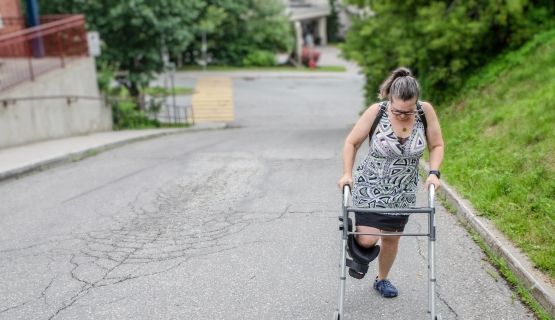Return to work, accommodation and support
IWH has a long history of conducting research on practices, policies and processes that help workers sustainably return to work after an illness or an injury. This page pulls together IWH research and resources on employer supports, job accommodations and modifications, as well as other related issues such as disclosure of disability.
Featured

Research Highlights
Telementoring program addresses return-to-work challenges for Ontario health-care providers
An IWH study has found that Ontario health-care providers face a range of challenges when treating workers with a work-related injury or illness and helping them return to work—a telementoring program called ECHO Occupational Environmental Medicine helped providers overcome some of these challenges.
Published: July 8, 2025

At Work article
Injured workers face mental health challenges beyond diagnosable conditions
Workers with a work-related physical injury that takes them off the job can have a wide range of mental health experiences, beyond diagnosable conditions. That’s according to an IWH study which also found that differences in injured workers’ mental health were linked to return-to-work outcomes.
Published: April 9, 2025
Project
Project
Ontario Life After Work Injury Study: Understanding the long-term recovery and labour market outcomes of injured workers in the shadow of COVID-19
Building on IWH's original Ontario Life After Work Injury Study (OLAWIS), IWH is looking in particular at the long-term outcomes of people who were recovering and returning to work during the early days of the COVID-19 pandemic.
Status: Ongoing
Journal article
Journal article
Sleep disturbances and disability following work-related injury and illness: examining longitudinal relationships across three follow-up waves
Published: Journal of Sleep Research, June 2021
Journal article
Journal article
Support for depression in the workplace: perspectives of employees, managers, and OHS personnel
Published: Occupational Health Science, June 2021

IWH in the media
Episodic health conditions
There's no simple "yes" or "no" answer to the question, “Should I tell my employer I have a chronic condition that sometimes makes it hard to work?” At the Institute for Work & Health, researchers have been working to develop a research-based decision-making tool. In one of the studies conducted to support the tool’s evidence base, the team explored people’s reasons for disclosing their episodic condition and found they do matter to the support they get, writes Dr. Monique Gignac.
Published: Rehab & Community Care, April 2021
IWH Speaker Series
IWH Speaker Series
Differences in the return-to-work process for work-related psychological and musculoskeletal conditions: findings from an Australian cohort
Many workers’ compensation agencies across Canada have begun accepting claims for chronic mental stress that results from work. In other jurisdictions where psychological claims have been accepted, such types of claims have been linked with greater costs and longer time off compared to physical claims. The potential reasons for these differences have not been well understood. In this IWH Speaker Series presentation, Dr. Peter Smith presents findings from a cohort study of 869 workers’ compensation claimants in the Australian state of Victoria. He highlights differences between the two groups of claimants (psychological and musculoskeletal) in their experiences of the claim and return-to-work processes, and discusses lessons for Canadian jurisdictions.
Published: April 2021
Journal article
Journal article
The association between case manager interactions and serious mental illness following a physical workplace injury or illness: a cross-sectional analysis of workers' compensation claimants Ontario
Published: Journal of Occupational Rehabilitation, April 2021

At Work article
Precarity more likely for older, new workers with disabilities
An IWH study finds the risks of working in precarious jobs are the same for people with and without disabilities. But among people with disabilities, precarity is more likely when people are older or have less job tenure.
Published: March 2021
Journal article
Journal article
Combined associations of work and leisure time physical activity on incident diabetes risk
Published: American Journal of Preventive Medicine, March 2021
Project
Project
Evidence-informed workplace policies and practices for the prevention of PTSI work disability
An IWH study will add to the guidance available to first responders (police, firefighters, paramedics) in Alberta and beyond on the workplace policies and practices that may help prevent PTSIs.
Status: Ongoing
Project
Project
Future-focused job accommodation practices for the school-to-work transition
Difficulties faced by young people during the school-to-work transition can have a lasting effect and contribute to adverse labour market outcomes that extend across one's working life. This studies explores the emerging barriers that young people with disabilities could face in accessing needed job accommodations within the changing world of work.
Status: Ongoing